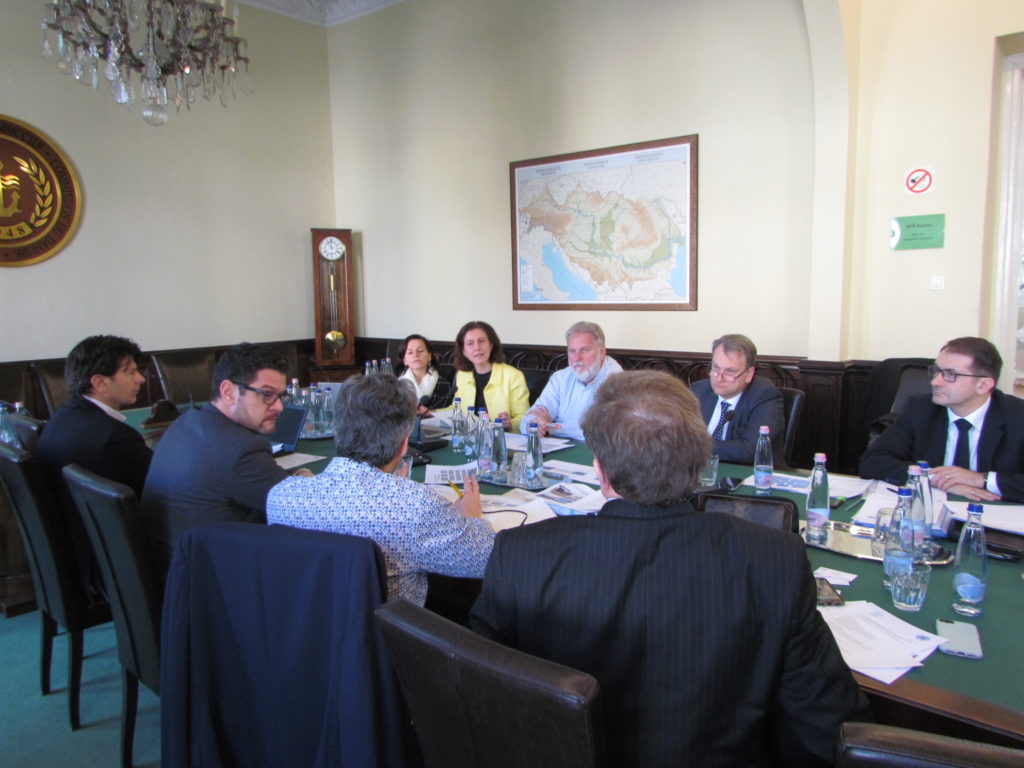Danube Commission supports Port development programme in Danube region
On 6 February 2020, the Danube Commission (DC) hosted Mr Mark Assaf of the UNCTAD TrainForTrade Port Management Programme (PMP) and Mr John Moore of the Dublin Port Company/Irish Aid to discuss ways of adapting the training programme to the needs of the Danube ports. The discussion also covered the next steps for developing a specific model of cooperation and coordination among UNCTAD, the DC and the Danube Ports Network (DPN), in order to facilitate the development and implementation of a dedicated port management training scheme for the EU/Danube region, benefiting river and sea ports on the Danube.

The DC is to act as a facilitator for setting up an improved education and training initiative in order to increase the working capacity of the Danube ports in different areas, including human capital. Today, there are 75 ports and 198 terminals on the Danube, and while they are certainly among the most dynamic elements of Danube navigation, they require constant development. The meeting served as preparation ahead of the meeting of the DC’s Expert Group on Crew and Personnel, to be held on 27 April 2020 in Budapest, which will discuss, inter alia, the benefits of developing and implementing a comprehensive education and training initiative for ports in the Danube region.
The discussions and presentations focused on the main global trends like demographic change, decarbonisation and digitalisation, the impact on ports, IWT operations and people, and the need for the port administrations to strengthen their institutional capacities and change their mindset to be able to effectively address the associated challenges, risks and opportunities.
The Port Management Programme operates through four language-based networks (English, French, Portuguese and Spanish) in Africa, Asia, Europe, Latin America and the Caribbean. Training in the beneficiary ports is delivered by certified local instructors from the port community, supported by experts from UNCTAD and ports associated with the programme. Senior managers from the participating ports are trained to serve as local instructors in order to ensure the programme’s sustainability and local ownership. The Government of Ireland (through Irish Aid and seaports in Ireland) is the main donor of the PMP (considered also as an example of best practice).
The DPN is to act as a key interface for UNCTAD in the definition and implementation of a dedicated Danube port training programme for middle managers.
The Port Governance Agency (PGA) of Serbia reported on previous activities with the UNCTAD port development programme in the period 2017-2018. Serbia is one of the countries benefiting from the PMP, and as a beneficiary, the PGA attested to the advantages of successfully participating in the programme.
The Hungarian Federation of Danube Ports (HFIP) informed the meeting’s participants about the Port Operator Professional Training jointly delivered with Ecotech Zrt. and the University of Dunaújváros since 2016.
The following day, on 7 February 2020, the DC hosted two representatives of the European Federation of Inland Ports (EFIP), Mr Friedrich Lehr, EFIP President and Managing Director of the Port of Vienna, and Mr Turi Fiorito. The EFIP highlights and promotes the role of European inland ports as genuinely intermodal nodal points in the transport and logistics chain, combining inland waterway transport with rail, road and maritime transport. Discussions centred on bilateral cooperation, policies and projects in the Danube region. The EFIP will be granted observer status with the DC.
